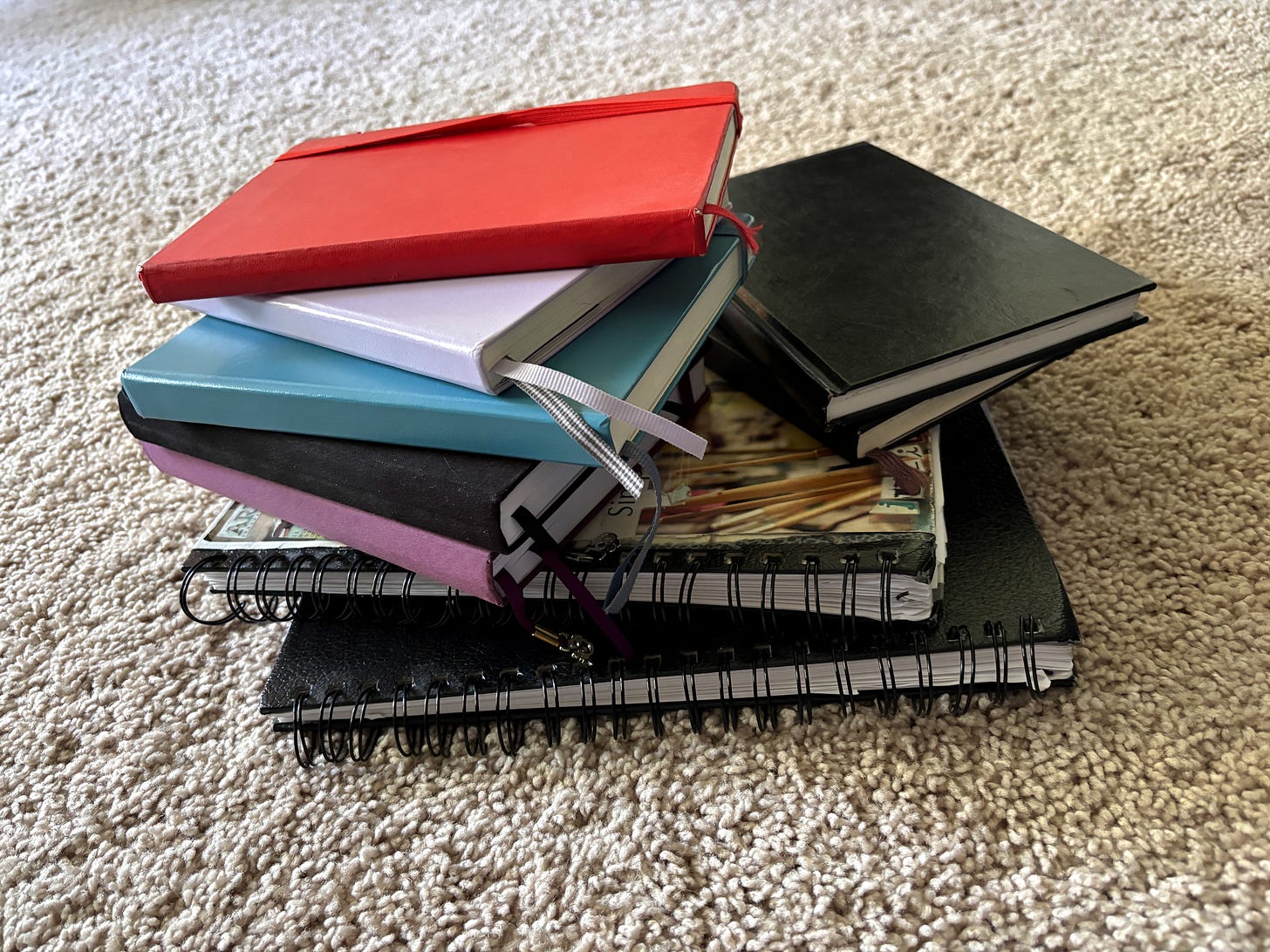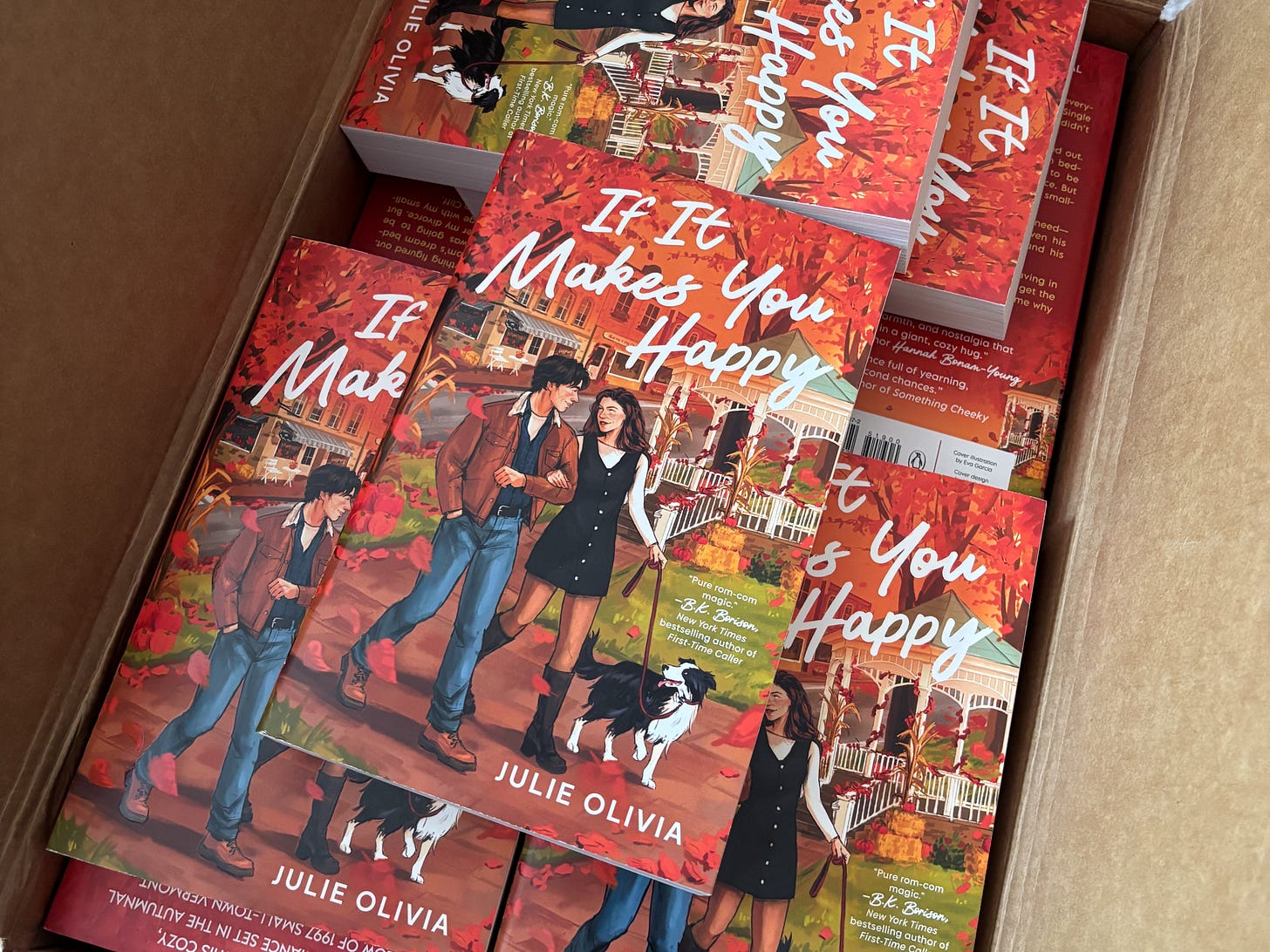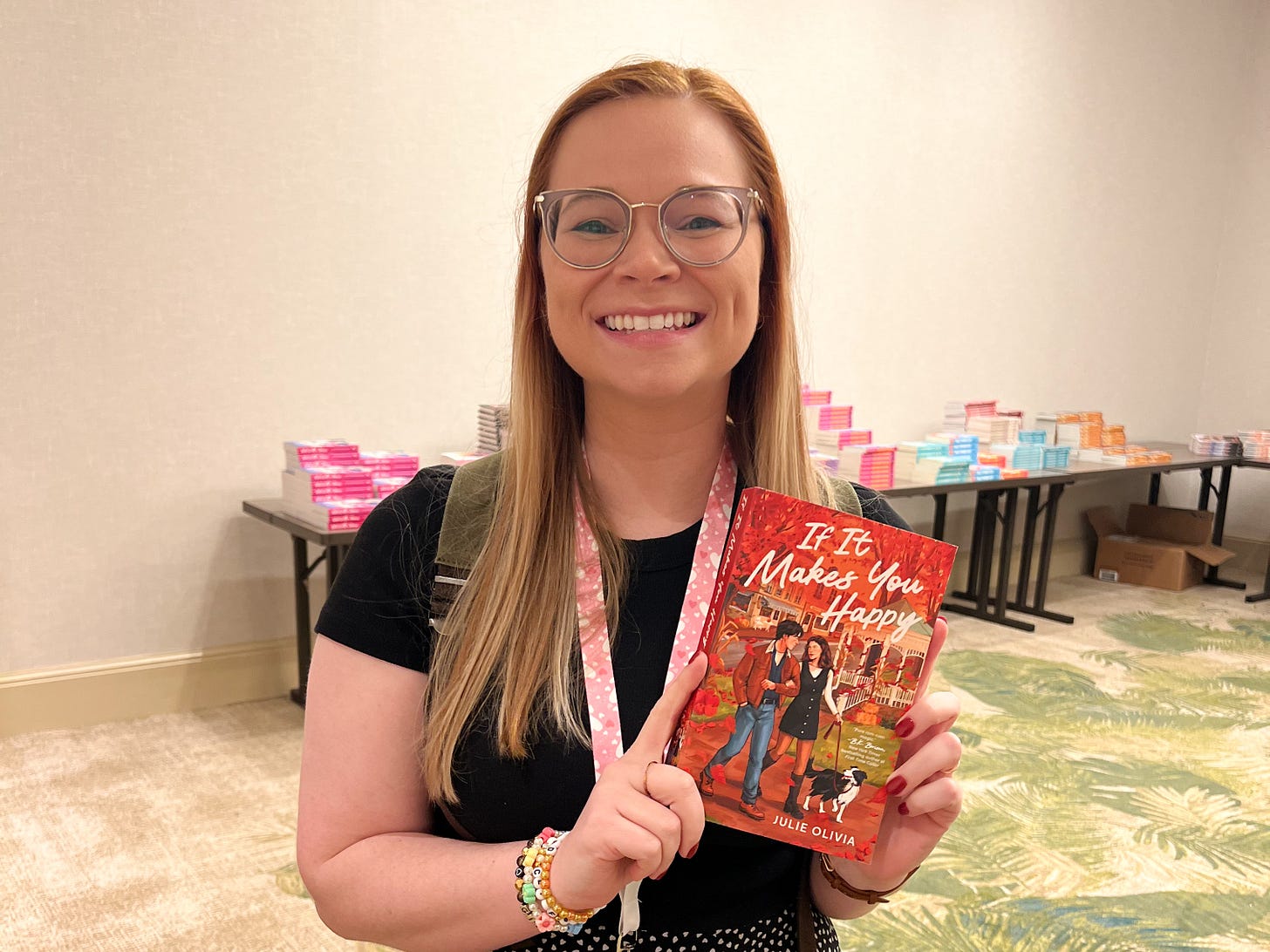What Else?: A conversation with Julie Olivia
A fun, fall romance plus how to crush through a first draft
Do you ever wish you could escape?
Go to a place where nobody knows you. Allow yourself to reset. Instead of answering emails at a desk, you could learn a new skill or art form. Maybe make some delicious new food. You’d be able to rediscover yourself without the chaos of everyday responsibility. Eventually, you’d feel better. And from this you might even discover what your heart truly desires.
Some version of this thought crosses my mind a lot, especially now with the end of Summer Fridays at work and an inbox full of annoying questions. I’d much prefer to run away. Instead, I’m usually escaping by way of my reading material.
The perfect book for getting away from it all this time of year is hands down If It Makes You Happy by Julie Olivia. Michelle is having a rough go of things with her recent divorce. She doesn’t think taking over her mom’s idyllic Vermont bed and breakfast will help things, especially given her lack of people skills. Enter Cliff: the charming single father next door who is as delectable as the treats he makes in his bakery and keen to help her win over guests. While these two fall into more than just a pile of leaves, readers get to live vicariously through the autumnal fun, meeting a cast of endearing small-town busybodies along the way. Reading this novel truly feels like putting on your favorite sweater: cozy, comforting, and totally irresistible as we head into cooler days.
Julie and I talked about how her artistic background has helped shape her work as a writer. She also shares what she’s most excited about with If It Makes You Happy releasing with Berkley this month.
What is something you do unrelated to writing?
What do I do? For a long time, reading and writing was what I did outside of my job. Then when this went full-time, I was like, “Dang, I have to figure out something else to do with my evenings now.”
Most of my life, I was drawing. I was an illustrator. I really wanted to pursue comics. So I picked that up again. I majored in art for a couple years in college until I got burned out. It’s been really freeing to draw just for me in a little sketchbook that no one has to see, where there are no goals involved.
Was your day job before writing related to the art world?
Not at all. I worked in human resources. My college degree was in mass media arts, so that was more focused on video editing. And then I realized that was not a career I wanted to go down. Everyone said in the movie industry you have to be married to your job. Writing isn’t too different. Even though I am married, I’m also very married to my job, so it’s funny how that worked out.
So, after college, I took an office manager job. In that role, I turned into a jack of all trades, where one of my tasks was interviewing people. When I changed jobs, I looked at roles involving that. I got certified, did the whole thing, but it wasn’t for me.
Do you find the creative process for visual art different from writing?
I see things in my writing very visually, like a movie playing out in my head. If I’m stuck in a scene, I’ll write the conversation first, because I can visualize that. I can sit in a room and watch two people talk to get the cadence of what’s going on, and then I fill in the blanks.
When I write a chapter, I go through it multiple times, adding more details, and then inevitably I go back and find it sounds like a script with stage directions. I have to cut them out. But I’m very much a visual person, and I think that comes from art as well as the video editor background, looking at footage and arranging it that way.
I know a lot of writers put together mood boards for their characters. But I wonder if you ever try to illustrate your characters.
It might be something that pops up in my sketchbook when I’m zoning out. I tend to sketch when I’m watching TV. I like to keep my hands moving. But it’s not part of my process. Pinterest boards, however, as such a key part. I have them on my website and I love them.
I’ve mentioned before in this column that there seems to be a desire among writers to succeed in all art forms they try. Do you ever feel this pressure when you’re sketching or can you let go of the critical element?
I’m always going to be critical. It never goes away. It’s awful.
I try to tell myself this is a sketchbook. No one will ever see it unless you choose to show somebody. It doesn’t have to look good. But then in my mind, I’m like, “Well, what if I die?” If someone finds this and then the last thing everyone thinks about me is that this girl can’t draw. It’s so dumb.
And it’s a struggle, too, with social media. I recently got into reading on Substack, and I’ve thought of starting one just for art. I have to remind myself I don’t have to monetize everything in my life. Things can just be hobbies.
You said you always had the day job and writing was the side thing, but now writing is the main gig. How did you feel about making that transition? Was there any anxiety in getting rid of the “safety net”?
It was very exciting, and still feels very unreal. I’ve been full-time for three years now. I’m scared shitless all the time because if it doesn’t work out, I don’t know where I’m going to go. I won’t go back to HR, so what skills have I acquired that I can apply to a different thing?
Thankfully, that’s something I haven’t had to worry about in a while, but it’s a creative industry, and things shift, so this is not a guarantee. I always have to keep that in the back of my mind.
At what point did you know you were ready to jump off the diving board?
It was a very gradual thing. There are some people who have this story of, “This is the book that changed my life when it blew up.” That didn’t happen to me. I like the way my career progressed. It was a snowball effect.
I published indie, and with each book my base level income rose a little bit. I was working double duty. On release days, I was having to take PTO so that I could juggle everything. It got to a point where my husband said, “Listen: if you have normal working hours for this job, then we can do this. You won’t be as stressed, and you can probably knock out more than you would in the four to six hours after work.”
You started publishing independently. Why’d you choose to go into books that way?
I liked the control of it, honestly. I liked being able to do whatever I wanted, especially in my day job where everything was very rigid. If I could write a book—put everything into it, including all the marketing because I have a background in illustration/design—why wouldn’t I do that?
I didn’t have this dream of being in bookstores. It’s really cool and beyond exciting that it’s happening, but I didn’t want to query or go through the trenches. So I did tons of research in indie publishing. I absolutely loved it. I’ve met so many great people and it’s given me room to learn my craft with less pressure. I didn’t sign a contract so I’m not playing with another person’s money.
I’m still figuring things out. I have no idea what I’m doing. But I love the path I’ve taken and can’t imagine any other.
How have things changed from book to book beyond you feeling stronger as a writer?
It does get harder. When you’re writing your first book, you’re just enjoying the process. But as you write more books, you’re more aware of what is wrong with it. You realize you need extra layers. You notice more of the flaws even though your writing is better. I have a better vocabulary for what I’m trying to write now. I’m also still reading craft books and learning. Every single book changes in some way as a result. I try to read a craft book in between each book that I write.
I don’t think I’ve read a craft book since finishing my MFA…
Girl, you should! It’s one thing to read it and understand the concept, but it’s another to apply it to the book you’re working on. It takes on a different meaning. Analyzing your own work is so important for growth.
Have you figured out the whole reading for pleasure thing?
No.
*laughs*
When you start writing and analyzing writing, you will never read the same way again. Even when I pick up comfort books that I’ve read a thousand times, I will start to look at the sentence structure.
I remember the first or second day of my video editing intro class in college, my professor said, “Fair warning: you will never watch movies the same way because you know how the meat is made.” And it’s true. I still read a lot every year. I love books, but it takes a lot of effort to be able to disappear into the story. I can only do it if I read a genre that’s not a comp. Even then, I’m thinking about how the storytelling is different. It never goes away.
You’re a crazy prolific author. What’s your secret? Especially for first drafts.
Allow yourself to have a crap first draft. And I’m talking crap. You cannot edit words that aren’t there. The editing process is my favorite part. I love having the bones and being able to make them sound pretty. My first few books, I had the cleanest first drafts, but they’d take forever. Another author friend told me her first drafts were terrible, so I decided to try it. It’s great. You get the words down. There’s no pressure. And when you’re done, you can go in and make it make sense.
I normally rework the first twenty to thirty thousand words. I’m very particular about that because I want to set the groundwork. But after that, if something changes, I’m not going back. If I introduce a new character, that’s Draft Two’s problem. Knowing when you need to just move onto the next chapter is how I get through first drafts without driving myself insane.
Let’s talk about If It Makes You Happy. What excites you about this book? Are you surprised it will be your first traditionally published?
Listen: I have a lot of children, I play favorites. And I am so happy that it’s this book getting released to a broader audience. I think it’s the best book I’ve written, if not tied for first. I’m so incredibly proud. I’m not surprised this is the one getting released because I feel like I’m putting my best foot forward for a new readership. I’m surprised the whole process is happening, but I’m not surprised that this one would do well.
Technically I did release it last year as an indie. A lot of my readers have already read it. But I’m interested to see what it’s like going out to a much broader readership. The people who read indie romance feel like a big group, but in the grand scheme of things it’s so niche. I’m in a lovely space of the internet where everyone is so supportive of indie authors. Even if your book sucks, readers are still going to cheer you on while pointing out the bad things.
It will be cool to walk into bookstores and see my book, but I’m also nervous because I don’t know what the average person is going to think. It’s multi-layered. It’s a brand new experience.
Julie Olivia writes cozy love stories filled with humor, spice, and close friend groups that feel like a warm hug. She is a roller coaster fan, avid romance reader, and rainy day enthusiast. Before writing romance novels, Julie moonlighted as an illustrator and worked in Human Resources, in which she still maintains a SHRM-CP certification. However, she decided writing about office romances where they break all the policies was far more enjoyable than enforcing them. She lives in Atlanta, Georgia with her husband and their very vocal cat.
I’m a little obsessed with the Jellycat pigeon, exclusively available in London. But now New York is getting a big bird of its own. Strutton Pigeon has flown into the Jellycat Diner at FAO Schwartz. I can’t wait to head uptown and pick one up.
It’s US Open time, which means the return of the iconic Honey Deuce cocktail. The fruity little drink will run you $26 at this year’s competition. Why not pick up the ingredients and make your own at home?
If you’re in the market for a writing class, might I recommend one Elissa Bassist is teaching. Her feedback on my work was more influential than most of my MFA program. She’s the best for shaping your voice and fine-tuning your humor.







